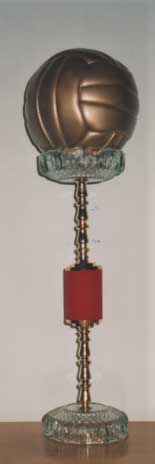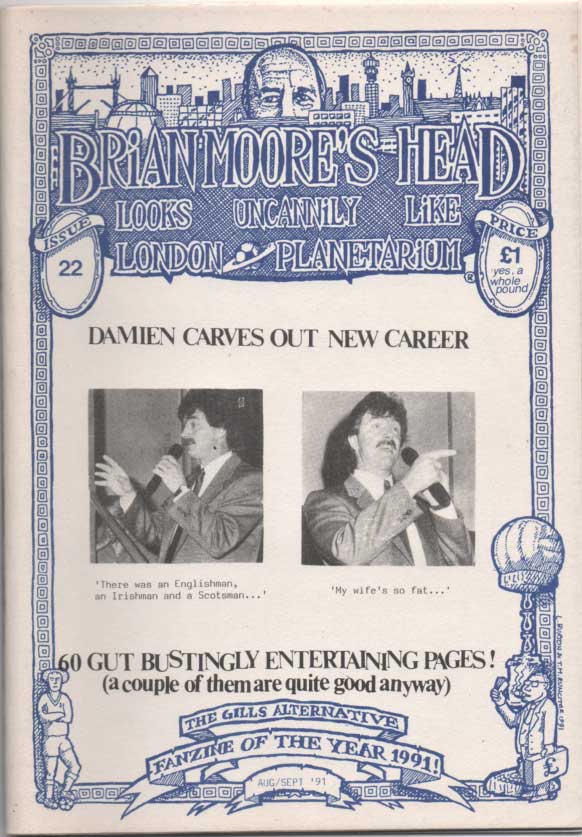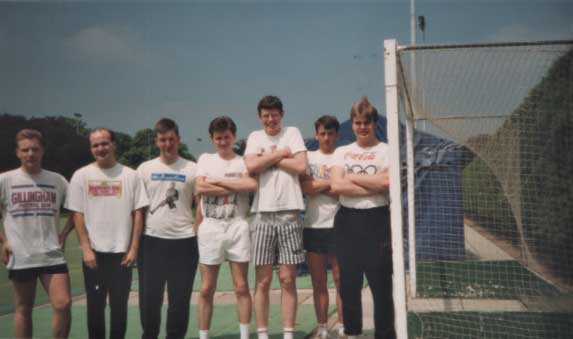Andy Ford delivers article ten in his fanzine based series.
On Tuesday 23 April 1991, a letter was received at BMH headquarters advising that Brian Moore’s Head had been short-listed, along with three other publications, for the National Fanzine of the Year award, with the winner to be announced at an event called ‘You’ll Never Read Alone’ at the Birmingham Readers and Writers Festival, due to take place at a venue opposite Edgbaston, the home ground of Warwickshire County Cricket Club, on Sunday 5 May.
BMH was represented by Simon Baker, Chris Lynham and myself. In the previous day’s edition of the Independent newspaper, Henry Winter’s column included the following, ‘The great fanzine fraud, which has confused organisers of tomorrow’s Golden Boot award for the top rag, can now be solved. Kettering Town’s ‘Poppies at the Gates of Dawn’ proved twice as popular as its nearest rival when the votes were counted at the Birmingham Readers and Writers Festival.
There was one problem. Most bore Kettering postmarks and the rules stated that only fanzine editors could vote. “Kettering copied their nomination form and sent fifty back”, the Festival’s Jane Clothier said. “It was pretty obvious. What we had to do was weed out the phonies. But they still made our shortlist”. The Kettering fifty plead innocence. Lorna Cheetham, the Poppies editor, said, “I received the fax late so I handed out copies before the Barrow match. I’m sure it said on the entry that all supporters could vote”.
Poppies has been banned by Kettering (trebling its sales) but is still available at ‘underground outlets’ within the club. Joining it on the shortlist are From Behind Your Fences (Boston United), King of the Kippax (Manchester City), and the hot favourite, Gillingham’s off-beat and Rolf Harris-obsessed Brian Moore’s Head Looks Uncannily Like London Planetarium.’

The event included lectures by John Duncan from national football fanzine When Saturday Comes, journalist Adrian Goldberg and representatives from two local-based publications, West Bromwich Albion’s Grorty Dick (a grorty being a traditional Black Country casserole dish), and ‘A Load of Bull’ from Wolves, named after Steve, their prolific goalscorer of the time. The awards, of which there were two, came at the end of the day. First up was ‘Football Writer of the Year’, won by Richard Smith, editor of Boston United’s ‘From Behind Your Fences’. Boston were still a non-league club at the time and the title referred to the fact that their ground still had perimeter fences, a rarity outside of the Football League.
It is fair to say that the nerves amongst the BMH trio were jangling somewhat by this stage. It was finally time for the result and the winner of the ‘Fanzine of the Year’ award was announced as Gillingham’s ‘Brian Moore’s Head Looks Uncannily Like London Planetarium’. To the accompaniment of warm applause, we somewhat sheepishly went up to collect our prize of £100 and a trophy. No thought had been given as to what we would say in the event of winning (no doubt we hadn’t wanted to tempt fate by preparing anything, in case we didn’t triumph) so our acceptance speech was probably lacking in quality and fluency.
The trophy was large, cumbersome and, quite frankly, bizarre, seemingly including a couple of glass ash trays, some felt and a sprayed football amongst its component parts. After posing for a few photos, none of which I have ever seen, I phoned up Andy Bradley from the Chatham News and Standard to pass on the good news.
The Readers and Writers Festival organisers were keen to attract as much publicity as possible and asked us to go along with a story they had concocted, which we agreed to do, and, on the following day, a newspaper duly reported that we had accidentally left the trophy in the toilet at Birmingham’s New Street station whilst travelling home from the event.
We had actually driven to and from the Midlands. There was also talk that the organisers were trying to arrange for one of us to be a guest on Jonathan Ross’ Channel Four show, but nothing more was heard about that. The success hadn’t gone to our heads, we stopped off in the centre of Birmingham on the way home for a celebratory pie and chips and then continued our journey south to the musical accompaniment of Simon and Garfunkel. The following day, the May Day Bank Holiday Monday, the fanzine got a mention on Channel Four, with the cover of issue 20 shown, and there was a feature on the awards in that day’s Guardian newspaper, under the heading ‘Scribes win golden boot for Brian Moore’s Head’.
On the Tuesday, the publicity machine creaked on, in print, in the Chatham Standard, on audio, with coverage on Radio Kent and Invicta Radio, and visually, on TVS (Television South, the independent broadcaster for our region at the time, which was on air from 1982 to 1992, preceded by Southern Television and superceded by Meridian).

The ‘Fanzine Of The Year’ returned for its fourth season, with issue twenty-two, in August 1991, received from the printers on Tuesday 13 August and officially put on sale at the opening home match, four days later, a 4-0 victory over Scunthorpe United, thanks to goals from Karl Elsey, David Crown, Mark O’Connor and Peter Beadle. The day after the fanzine was delivered I took a box containing 160 issues up to our London stockist, Sportspages. It was the heaviest package I’d taken as the 60-page issue was the biggest ever, by sixteen pages. It was also the most expensive, with the cost doubled from the previous campaign.
The editorial included, ‘As you will no doubt have noticed, the cover price has been increased to a pound. The result of our canvassing the readership on this subject showed a clear majority in favour of this move – the proportion in favour being something like seven to every one against. Had the result gone the other way we certainly would not have gone against your wishes but, we feel that in light of this, and in light of the fact that this issue has been increased in size to sixty pages, most of you will not find the increase unacceptable.
As we have stated before, we intend to use any profit for kit sponsorship etc and the undertaking of projects like T-shirts and badges etc, which you need up-front cash to pay for.’
The increase in the number of pages brought with it more typing, so there was good news when BMH became a two typewriter fanzine in June 1991. Negotiations for one of my employer’s redundant typewriters had been ongoing for a while and I finally managed to acquire one, which then led to the problem of how to get it from the office in London Bridge to home. It was large and cumbersome but I was helped by the fact that I worked about two minutes walk away from the station.
I managed to get the typewriter on to the train and stashed it in the guard’s van (this was back in the days of the slam door trains) for the journey. I was then picked up at Gillingham and got the machine indoors in one piece. Typing articles was a taxing task, especially if the original piece had been penned with poor handwriting, with deciphering required before work could start.
BMH22 included a report of the fanzine’s football team’s first tournament abroad, with a seven-strong squad heading to Cardiff to take part in the second South Wales Football Supporters’ Association six-a-side tournament on Saturday 1 June 1991. There were ten teams involved, with England, Scotland and Wales represented. It was more professional than our very own ‘Planetarium Trophy’, with a twelve-page programme produced, which included a page on Brian Moore’s Head, featuring a potted history of our footballing efforts to date, including a 7-1 defeat against a team of Cardiff fans on a Saturday evening in the previous November, which took place at Strood Sports Centre after the Gills had beaten the Bluebirds 4-0 at Priestfield, and a team photo.
Unfortunately, we had to travel down on the day, and with three in the back of our car-load of five, the cramped conditions were far from ideal. The remaining two members of the squad were travelling from Reading and we met up at Membury Services, the duo including Chris Lynham who had his priorities spot on, taking part in a football tournament when he was in the middle of his University Finals exams.
There were two groups of five teams, with the winners and runners-up in each qualifying for the semi-finals. Our first game was against St Johnstone fanzine ‘Wendy Who?’, and we won 1-0. I scored my obligatory one goal per tournament in this one and was quick to emphasise that it was my, and the team’s, first goal in European competition. You can’t get more European, without the need for a passport, than an English side playing a Scottish outfit in Wales.

The pitch was Astroturf, which was no real problem, we could be equally as poor on any surface, but the size of it was an issue, with the large dimensions coupled with the heat (it was very hot), our general lack of fitness and the fact that we’d spent four hours travelling, left us struggling for breath late on in the game and trying desperately to coax movement from our lower limbs. We just about managed to hold on to our slim advantage.
Despite leading, for as long as half a minute, against Hereford’s ‘Talking Bull’, in game two, we went on to lose 4-1. The best action came off the pitch. After the ball had gone out of play, over a wall and into the road (not caused, as I recall, by a wayward pass from my good self), BMH’s Phil went off to retrieve it. With the wall too high to climb over, he used a goal, that was propped up against it, to get over it. However, without the benefit of a goal or similar climbing aid on the other side of the wall, he was unable to get back. So, Phil waved down a passing lorry and asked the driver for assistance. Having climbed on said lorry, Phil was then able to get back over the wall.
Despite playing our best football in game three, we lost 5-2 to ‘Dial M For Merthyr’ and then, with fatigue setting in, were soundly beaten 3-0 by the ‘Leyton Orientear’, when we were, quite frankly, shockingly poor, only the wall-climbing Phil emerging with any credit. We ended up fourth out of five and the fact that the top two in our group, ‘Talking Bull’ and ‘Dial M For Merthyr’, both lost in the semi-finals, suggests that ours had been the weaker of the two sections.
After Chris and Dean set off to return to Reading, the former to revise for his four Economics exams the following week by watching Crystal Palace’s Highlights of the Season video, the rest of us checked out our B&B (we’d decided it was too much to attempt to return to Medway the same day) and then settled down in a pub for a few drinks.
The article ‘A Load Of Cobblers’ in BMH22 covered our game at Northampton in April 1991, ‘On paper, it looked like being a depressing experience, Northampton were riding high in the table thanks to their flowing and highly entertaining brand of football (spot the subtle use of sarcasm), Gills on the other hand were playing like a bunch of big girl’s blouses.’ However, there were some plus points, ‘I am glad to report that, compared to our last visit in 88-9, the policing and general atmosphere at the County Ground was far more inviting.
Gone was the Stalag Luft Northampton we had previously encountered, and you could just saunter up to the turnstile, pay your money and enter without going through the rigmarole of possessing a match ticket, membership card, clean driving licence, and written testimonial from the Pope. There was no need to surrender your party poppers, combs and other offensive weapons, and it was very nice to see that it appears to have dawned on the Northants constabulary that the over the top and oppressive policing we encountered in ’89 is neither necessary or desirable.
Another brownie point to the Cobblers for allocating the uncovered kop at one end of the ground to visiting supporters, rather than shoving us all in the grotty little bit of terracing next to the Meccano Stand.’
As for the match itself, it was one that Gillingham goalkeeper Harvey Lim probably doesn’t remember with too much fondness, ‘The game started. The rain started. Harvey made a pig’s ear of dealing with a cross and the ball was thumped into the net.
With twenty minutes gone, we were cold, wet, losing 1-0 and we wanted to go home. Fortunately, things picked up rather, Lovell had a goal disallowed, then Gills won a penalty. Trusson stepped up and coolly deposited the ball into the onion bag. Now we were cold, wet, drawing 1-1 and could stand to hang around for a bit longer’. The score remained 1-1 right up until the final minute, ‘With time fast disappearing into oblivion, Gills appeared to be heading for a deserved point, but then Harvey was once again at fault trying to deal with another airborne assault, and the ball was in the back of the net for the second time.
This was not the happiest moment I have experienced as a Gills supporter. A few more seconds elapsed before the final whistle signalled another defeat. We trudged out of the ground and walked back to the car, past the smiling faces of the home fans, who were all discussing promotion and the Play-Offs. I can’t tell you how painful it is to hear opposing fans talking about something that remains, to all Gills fans, an elusive dream.’
The victory left Northampton in third place in the division four table with eight games to play. However, they failed to win again as their promotion push petered out with two draws and six defeats. They ended up in tenth, five places higher than the Gills.
